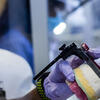Temple University Kornberg School of Dentistry Postbaccalaureate Program
The Temple University Kornberg School of Dentistry offers an intensive, 11-month, preparatory program designed specifically for motivated, pre-dental students to advance their bachelor’s degree and improve their candidacy to achieve admission to U.S. and Canadian dental schools. Our intensive curriculum and DAT-prep course is paired with dental assisting training and practice, allowing students to prepare a more competitive dental school application within a structured and motivating learning environment.
Postbaccalaureate to Masters in Oral Health Sciences track
Students who successfully complete the coursework in this Postbaccalaureate program with a minimum 3.0 GPA and two letters of reference from instructors in their program may opt to complete an additional year of coursework to earn the Master of Science in Oral Health Sciences (MS OHS). For students who qualify, 15.0 credits from the Postbaccalaureate program will be applied towards the completion of the 40.0 credit MS OHS degree. Some restrictions apply. For more information contact Theresa White, Director of Graduate Programs at theresawhite@temple.edu.



